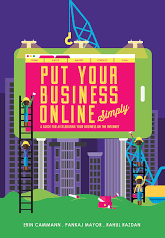What is the Next Step for Specialty Retailers (Petsmart, Staples, FootLocker,Office Depot etc)? A method to Enhance Customer Loyalty, Drive Growth, and Build Durable Competitive Advantage.
Executive Summary:
In the last 10 years, specialty retailers have grown rapidly. The list of successful companies include names such as Staples, Dick’s Sporting Goods, Petsmart, Petco, Sports Authority, Hobbylobby., etc. Recently many of these specialty retailers have encountered challenging times due to the disruptive business models coming from the likes of Amazon, Walmart and Target. In this thought piece, we assert that specialty retailers could significantly benefit from leveraging local SMB service providers as valuable customers and partners. As a customer, the SMB community is a valuable market which can be large in its own right as well as provide thought leadership to the broader customer community. As a partner, the SMB community can provide valuable complementary services which can be “networked” through the specialty retailer (similar to Apple’s iTunes store) to complement their traditional product sales.
With this strategic direction, specialty retailers can capitalize on their traditional strengths (brand, knowledgeable employee force, and nationwide retail presence) with a cloud-based, SMB optimized platform (their ITunes) to build a business with high-margin revenues and durable competitive advantage.
Details:
Specialty retailers ranging from Office Depot to Dick’s Sporting Goods have built very successful product businesses. However, recently, like many specialty retailers, these companies have faced challenges in the marketplace. Examples include significant store closures at Staples, Office Depoit/OfficeMax, Radio Shack, Best Buy, etc.
Figure 1: E Commerce Space
Statista Chart of Day: http://www.statista.com/
Specialty retailers are caught in the middle of two powerful forces, ecommerce and colossal scale one-stop retail. With ecommerce, Amazon provides a compelling solution for customers who are looking for convenience with almost infinite inventory and are willing to wait for the shipped product. Meanwhile, retailers such as Walmart and Target provide low prices and the convenience of one-stop local shopping experience with a specialized pod structure. Specialty retailers must build differentiated value statements beyond discounting to pull customers to their stores. What is the answer?
Initially, some of these companies have been trying to expand their ecommerce through their own brands. As figure 1 shows, Staples has seen some success with this model, and Office Depot also has a presence. However, their long-term durable advantages against Amazon/Walmart are not clear. This begs the question: What competitive advantages can specialty retailers leverage to service their customers? In our view, they are:
- Strong Brand in the area of interest
- Nationwide retail presence to interact at the local level.
- Knowledgeable staff
Why does focusing on local small businesses make sense?
The SMB marketplace is a large market (over 28 Million in US alone), and for business oriented specialty companies such as Staples, Office Depot, Best Buy, and Radio Shack, this can be an interesting market purely from a customer point of view. Based on our research, SMB market has significant needs which can be addressed by the business oriented specialty retail players.
Even if the direct market is not large enough, local small businesses are typically the thought leaders in the community for a particular function. When your fishing guide says, this product is great, you will listen. At the same time, these small businesses are looking for a brand and technology platform partner to help differentiate themselves in a highly fragmented marketplace. Specialty retailers can fulfill these needs. How ?
Imagine a cloud-based platform (let’s call it SMB-Core for now) where complementary small businesses can either through a self-service portal or work hand-in-hand with specialty retailers to easily build a sales/marketing and operations infrastructure for their complementary SMBs in under a half hour. The cloud platform would provide the SMB:
- Home-page web presence optimized for user interaction, search, CRM, data mining, and mobile devices.
- Ability to build Offerings which can handle products as well as complex services working models (scheduling, questionnaires)
- Capability for SMBs to network with each other to propagate trust and build larger value statements for the customer
- Built-in inventory fulfillment engine (with automatic reorders to specialty retailer )
- Connections to the other standard cloud-based platforms used by the business (constant-contact, quickbooks, etc)
After the SMB is on the platform, there can be an additional ability to use the specialty retailer brand to drive traffic to the SMB with an “itunes/app store” style model. In this way, the specialty retailer can become the central organizer for local small businesses virtual communities.
With such a platform, the specialty retailer can build a strategic relationship with the small business with several significant differentiating features:
- Small Business will value the core capability, and once adopted, the system will become part of the core process flow of their company. The specialty retailer will be seen as the foundational underpinning which enables their business. Specialty retailer could charge for this capability ($25 to $50/month) or monetize it in other ways.
- With automatic fulfillment of consumables, specialty retailer would have differentiated access to these businesses for their office supplies. Today, the customer can get consumables/commodities is one of a number sources.
- Specialty Retailer can charge a royalty for any traffic coming from their websites that generate a sale. (Apple Appstore charges 30%).
The strategic implications of the above approach are significant:
- Specialty retailer brand is leveraged in the consumer market for the benefit of the small business. Similarly, the thought leaders in the community are connected to the retailer's brand.
- Since the services typically require physical contact, the engagement through the SMB is a good hedge vs Amazon, and the perception of technical knowledge of staff reinforces this engagement.
- Specialty Brand can now sell services along with its products for a complete solution. This will not only create incremental high-margin revenue, but also fortifies the speciality retailer's traditional products business.
At Ocoos, we have been tirelessly building such a platform to help SMBs successfully grow their businesses. We have a fast, simple and powerful cloud-based solution that can bring significant efficiencies and ultimately bring structure to a very large fragmented arena. For more information on the solution, please contact rahul.razdan@ocoos.com .


